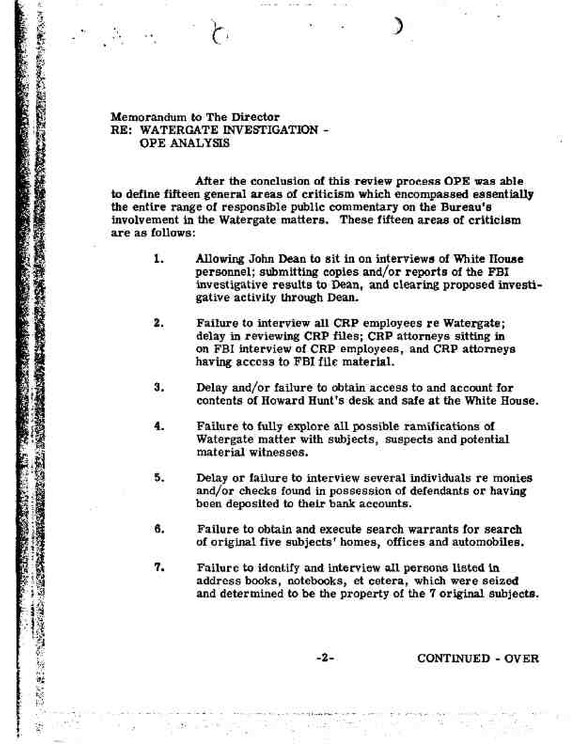Starting from:
$12.95
Watergate Nixon Recordings and Transcripts, FBI Review Files - Download
Watergate Nixon Recordings and Transcripts, FBI Files.
FBI FILES
140 of files copied from FBI Headquarters in Washington, D.C., covering FBI analysis of its conduct during the Watergate investigation.
NIXON TAPES - RECORDINGS AND TRANSCRIPTS
14 hours of selected conversations. Transcripts are searchable and printable.
The conversations were recorded on the White House taping system and White House dictabelts. The recording system was installed by the Technical Services Division of the U.S. Secret Service in February 1971. In addition to the line-taps placed on the telephones, small lavalier microphones were installed at various locations around the rooms. The recordings were produced on as many as nine Sony TC-800B machines. The existence of the White House taping system was first made public during the testimony of former presidential aide Alexander Butterfield before the Senate Watergate committee in July 1973.
Recordings include the "Smoking Gun," "Milk Fund," "Cancer on the Presidency," "Dean Resignation," and the "Telephone Conversations" tapes.
SMOKING GUN TAPE
Recorded on June 23, 1972 six days after the break-in. It recorded a discussion between Nixon and White House chief of staff H.R. Haldeman. Haldeman and Nixon discuss the progress of the FBI's investigation, especially the tracing of the source of money found on the burglars. When Nixon was told that the FBI's investigation was leading to Nixon's re-election campaign, Nixon instructed Haldeman to tell the FBI, "Don't go any further into this case, period." They propose having the CIA ask the FBI to halt their investigation of the Watergate break-in by claiming that the break-in was a national security operation. They discuss how Hunt's involvement in the Watergate break-in would point the investigators to the CIA, and potentially, Hunt's role in the Bay of Pigs debacle. After the "Smoking Gun" tape was released, Nixon lost Republican support in Congress. On August 9th, four days later after the release of the conversation, President Nixon resigned.
CANCER ON THE PRESIDENCY TAPE
Conversation recorded in the White House Oval Office on March 21st, 1973, between President Nixon, H.R. Haldeman, and John Dean. Dean recaps the history of the Watergate break-in and subsequent cover-up for the President. They guess at who was responsible for setting the break-in in motion. Dean tells the President that the cover-up is "a cancer on the Presidency" that must be excised, or his Presidency would be in danger. Also discussed: references to blackmail, perjury; discussion of paying the burglars off with one million dollars.
DEAN RESIGNATION TAPE
President Nixon discusses the need to have resignations of Dean (and Haldeman and Ehrlichman) "at the ready" and offers two options, "indefinite leave of absence" or "resignation", depending on plea. They discuss: Magruder questioned about Haldeman and Ehrlichman's role in cover-up; contrast between involvement of White House staff in break-in and cover-up; Hunt's blackmail; review of March 21st conversation; Executive Privilege; plumbers operation; Senate hearings; Segretti's dirty tricks operation; the need for open testimony; Ehrlichman's instructions to Colson regarding clemency for Hunt; Petersen's reports to President; form resignation letter.
OTHER HIGHLIGHTS
Recordings contain other conversations involving President Nixon, H.R. Haldeman, John Dean, John Ehrlichman, E. Howard Hunt, Charles Colson, or Herbert Kalmbach. Recorded in the Oval Office, Old Executive Office Building Office, on White House telephone, and dictabelt recordings. Topics include: bugs in other political campaigns; election law violations; the Washington Post's TV & Radio licenses; depositions on sex-lives of DNC members; possible reasons why McGovern was bugged; CIA connection between G. Gordon Liddy and Hunt; a rationale for the Watergate break-in; President Nixon compares the Watergate hearings with the Alger Hiss case; the possible use of $350,000 in campaign contributions to pay the Watergate defendants; Segretti dirty tricks; Operation Sandwedge (intelligence-gathering operation at the Committee to Re-Elect the President; conflict between Liddy and Magruder; quality of intelligence gathered from DNC; and Dean cooperating in hopes of immunity.


FBI FILES
140 of files copied from FBI Headquarters in Washington, D.C., covering FBI analysis of its conduct during the Watergate investigation.
NIXON TAPES - RECORDINGS AND TRANSCRIPTS
14 hours of selected conversations. Transcripts are searchable and printable.
The conversations were recorded on the White House taping system and White House dictabelts. The recording system was installed by the Technical Services Division of the U.S. Secret Service in February 1971. In addition to the line-taps placed on the telephones, small lavalier microphones were installed at various locations around the rooms. The recordings were produced on as many as nine Sony TC-800B machines. The existence of the White House taping system was first made public during the testimony of former presidential aide Alexander Butterfield before the Senate Watergate committee in July 1973.
Recordings include the "Smoking Gun," "Milk Fund," "Cancer on the Presidency," "Dean Resignation," and the "Telephone Conversations" tapes.
SMOKING GUN TAPE
Recorded on June 23, 1972 six days after the break-in. It recorded a discussion between Nixon and White House chief of staff H.R. Haldeman. Haldeman and Nixon discuss the progress of the FBI's investigation, especially the tracing of the source of money found on the burglars. When Nixon was told that the FBI's investigation was leading to Nixon's re-election campaign, Nixon instructed Haldeman to tell the FBI, "Don't go any further into this case, period." They propose having the CIA ask the FBI to halt their investigation of the Watergate break-in by claiming that the break-in was a national security operation. They discuss how Hunt's involvement in the Watergate break-in would point the investigators to the CIA, and potentially, Hunt's role in the Bay of Pigs debacle. After the "Smoking Gun" tape was released, Nixon lost Republican support in Congress. On August 9th, four days later after the release of the conversation, President Nixon resigned.
CANCER ON THE PRESIDENCY TAPE
Conversation recorded in the White House Oval Office on March 21st, 1973, between President Nixon, H.R. Haldeman, and John Dean. Dean recaps the history of the Watergate break-in and subsequent cover-up for the President. They guess at who was responsible for setting the break-in in motion. Dean tells the President that the cover-up is "a cancer on the Presidency" that must be excised, or his Presidency would be in danger. Also discussed: references to blackmail, perjury; discussion of paying the burglars off with one million dollars.
DEAN RESIGNATION TAPE
President Nixon discusses the need to have resignations of Dean (and Haldeman and Ehrlichman) "at the ready" and offers two options, "indefinite leave of absence" or "resignation", depending on plea. They discuss: Magruder questioned about Haldeman and Ehrlichman's role in cover-up; contrast between involvement of White House staff in break-in and cover-up; Hunt's blackmail; review of March 21st conversation; Executive Privilege; plumbers operation; Senate hearings; Segretti's dirty tricks operation; the need for open testimony; Ehrlichman's instructions to Colson regarding clemency for Hunt; Petersen's reports to President; form resignation letter.
OTHER HIGHLIGHTS
Recordings contain other conversations involving President Nixon, H.R. Haldeman, John Dean, John Ehrlichman, E. Howard Hunt, Charles Colson, or Herbert Kalmbach. Recorded in the Oval Office, Old Executive Office Building Office, on White House telephone, and dictabelt recordings. Topics include: bugs in other political campaigns; election law violations; the Washington Post's TV & Radio licenses; depositions on sex-lives of DNC members; possible reasons why McGovern was bugged; CIA connection between G. Gordon Liddy and Hunt; a rationale for the Watergate break-in; President Nixon compares the Watergate hearings with the Alger Hiss case; the possible use of $350,000 in campaign contributions to pay the Watergate defendants; Segretti dirty tricks; Operation Sandwedge (intelligence-gathering operation at the Committee to Re-Elect the President; conflict between Liddy and Magruder; quality of intelligence gathered from DNC; and Dean cooperating in hopes of immunity.


1 file (97.6MB)



